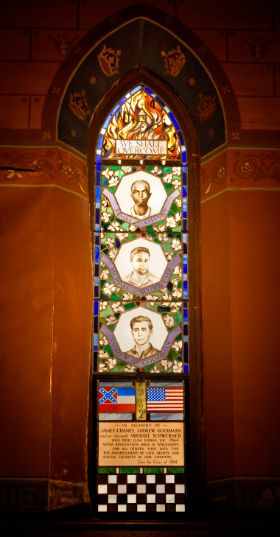Michael Schwerner is one of the heroes we celebrate in our family Haggadah.

from our Haggadah .. The Sixties Generation It was not bloodless in the free world of America. After the horrors of the World War, Americans rose up to defend freedom in their own country, freedom especially for the descendents of the American slaves. The student Bob Moses wrote: “We are smuggling this note from the drunk tank of the county jail in Magnolia, Mississippi … later on Hollis will lead out with a clear tenor into a freedom song, Talbot and Lewis will supply jokes and McDew will discourse on the history of the Black man and the Jew. “McDew — a Black by birth, a Jew by choice, and a revolutionary by necessity — has taken on the deep hates and strong loves which America and the world reserve for those who dare to stand in a strong sun and cast a strong shadow … “This is Mississippi, the middle of the iceberg. Hollis is leading off with his tenor, ‘Michael row the boat ashore, ALLELUIA; Christian brothers don’t be slow, ALLELUIA; Mississippi’s the next to go, ALLELUIA.’ This is a tremor in the middle of the iceberg — from a stone that the building ejected.”
Now, 50 years after James Earl Chaney, Andrew Goodman and Michael “Mickey” Schwerner were slain in Mississippi by members of the Ku Klux Klan, Schwermer’s his martyrdom has been recognized by President Obama’s the award of National Medal of Freedom to Mr. Schwermer’s wife.
Excerpts, including Obama’s speech, from the editorial in the Cornel Alumni magazine:
“Their deaths ignited outrage, prompting Congress to pass the Civil Rights Act and the Voting Rights Act. In the White House ceremony, Obama noted: “While they are often remembered for how they died, we honor them today for how they lived – with the idealism and the courage of youth,” he said.
“James, Andrew and Michael could not have known the impact they would have on the civil rights movement or on future generations. And here today, inspired by their sacrifice, we continue to fight for the ideals of equality and justice for which they gave their lives. Today we are honored to be joined by James’ daughter Angela, Andrew’s brother David and Michael’s wife, Rita,” Obama said.

James Earl Chaney, top; Michael Henry Schwerner ’61; and Andrew Goodman are memorialized in a stained glass window at Sage Chapel.
“[These were] young men,” Obama said. “And in that Freedom Summer, these three Americans refused to sit on the sidelines. Their brutal murder by a gang of Ku Klux Klan members shook the conscience of our nation. It took 44 days to find their bodies, 41 years to bring the lead perpetrator to justice.”
The medal’s citation reads: “In 1964, three young men sought to right one of the many wrongs of the Jim Crow era by joining hundreds of others to register black voters in Mississippi during ‘Freedom Summer.’ The work was fraught with danger, yet their commitment to justice was so strong that they were willing to risk their lives for it. Their deaths shocked the nation, and their courage has never been forgotten. James Earl Chaney, Andrew Goodman and Michael Henry Schwerner still inspire us. Their ideals have been written into the moral fabric of our nation, from the landmark civil rights legislation enacted days after their deaths to our continued pursuit of a more perfect union.”
In that era in the Deep South, white citizens with out-of-state license plates were seen as rabble-rousers, stirring up the African-American population, explained Robert Harris, professor emeritus of Africana studies. “The murders of Chaney, Goodman and Schwerner was something that struck the conscience of the country … and it served as a catalyst for individuals to become directly involved in the civil rights movement, because all Americans were now threatened,” he said.”